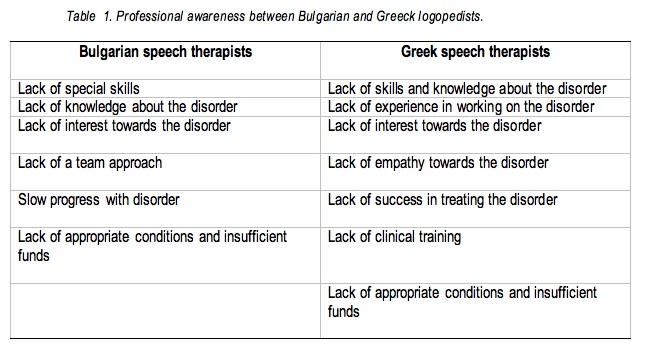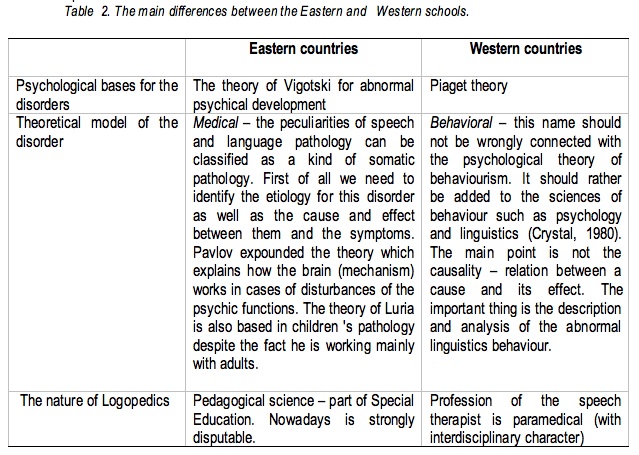Understanding Cluttering: The Bulgarian Experience
 |
About the presenter: Dobrinka Georgieva is an Associate Professor in Logopedics (Speech Therapy) at South West University (SWU), Blagoevgrad, Bulgaria, an former director of the University Stuttering Research Center. Dr. Georgieva's teaching, research, and clinical interests are in the area of fluency and voice disorders, as well as history of Logopedics and General Logopedics. She has authored numerous research and clinical papers, chapters in books and books for stuttering, cluttering, stuttering intervention and voice disorders. In addition, Georgieva has presented widely at national and international conferences and congresses on the topics mentioned above. She was the leading person developing the Bulgarian Logopedics specialty recognition and evaluation in the field of Public health. She is a member of IALP, IFA and the editor of the Bulgarian Journal of Communication Disorders. |
UNDERSTANDING CLUTTERING: THE BULGARIAN EXPERIENCE
by Dobrinka Georgieva
from Bulgaria
This paper contrasts the understanding of cluttering in Bulgarian traditions. A historical time line will be followed in describing the opinions and observations as they pertain to the following subjects: cluttering as a unique clinical entity, its definition, etiology, symptomatology, assessment, differential diagnostics, therapy, and public or professional awareness.
The Bulgarian logopedics does not have the traditions of Russian, German and Czech schools regarding cluttering studies. In Bulgaria, Logopedics has roots in German schools of thought as well as strong influences, since 1944, from Russian schools. Not surprisingly, explanations of cluttering have grown out of theories of stuttering. The Russian dominance in the area is evident - the most popular investigations are those of Kotchergina 's (1969) and Seliverstov 's (1979).
In Bulgaria three models of cluttering interpretation are dominant:
- The traditional Weiss (1964) concept: cluttering is regarded as a central language imbalance that affects all communication modalities.
- St. Louis (1992): cluttering is a speech-language disorder characterized by an abnormal fluency that is not stuttering, and a rapid and/or irregular speech rate.
- Daly's and Burnett (1999), Bennett (2006) linguistic disfluency model: the ABCs (Affective, Behavioral and Cognitive components) of cluttering have become popular among speech therapists.
Regarding the clinical management of cluttering, Myers'Synergistic Approach (subsequently discussed and elaborated in St. Louis & Myers, 1995, 1997, 2007) is the most popular in Bulgaria.
Cluttering was put on the map of communication disorders in Bulgaria.
In 1996 the first investigation on cluttering occurred -- 15 stutterers, primarily children, were evaluated at South West University 's Logopedics Center. Varieties of criteria (respiratory disrhythmia, disturbed voice modulation, excessive word and phrase repetitions, vowels prolongation, rapid speech rate, misarticulations, writing and reading problems, reduced motor coordination etc.) used for stuttering and cluttering in Bulgaria were applied to differentiate cluttering, stuttering and mixed cases. Based on these criteria, five subjects were diagnosed as clutterers (Georgieva & Miliev, 1996). Daly 's Checklist for Possible Cluttering was applied for the first time (Daly & Burnett, 1996). This study came as a result of the IFA 's first congress held in Munich in 1994 based on papers by Daly (1995) and St. Louis (1995). This event played an important role and has had a major influence on the study and clinical management of fluency disorders in Bulgaria, especially cluttering.
After 1994, a strong North American Influence (K. O. St. Louis, F. Myers, D. Daly, E. Bennett, K. Bakker and L. Raphael) shaped a new model of thinking regarding fluency disorders and especially regarding cluttering.
There has been some research in the area of Comparative Logopedics in connection with the professional awareness of the cluttering disorder in Bulgaria and Greece (Georgieva, 1996, 2000). The study shows that a large number of therapists do not feel adequately prepared and fear working with clutterers due to weak academic preparation, lack of clinical work, and insufficient published information. They are uncertain and uncomfortable about the choosing the right therapeutic procedure for the disorder. This is because they have had little clinical practice, few cluttering patients, and they don 't clearly understand the differences and similarities between cluttering and stuttering. The definition of cluttering remains controversial. Our study confirms St. Louis and Rustin 's results, but we found some specific differences regarding the interpretation of the main causes and symptoms.
In a separate study, Georgieva and Sparangis (2001) sought to understand which communication disorders experienced clinicians prefered to manage in Bulgaria and Greece.
It is possible to conclude that the following factors determine why the Bulgarian and Greek speech therapists are the most reluctant to work with a disorder like cluttering:

The study shows there are a large number of communication disorders which therapists in bouth countries poorly understand and are reluctant to work with. These include laryngectomy, speech disorders of mentally retarded, autism, stuttering in adults, and cluttering.
Our research supports other studies finding that speech therapists do not feel competent to treat stuttering and cluttering (St. Louis and Hinzman, 1986; Georgieva, 1997).
In contrast with therapists in the rest of Eastern Europe, Bulgarian therapists widely hold that cluttering is a distinct speech disorder, similar to stuttering but different.
The Fluency Disorders course, included in the educational curriculum of the Specialty Logopedics program at South West University, presents cluttering as a distinct disorder.
Conclusion:
While cluttering is well known in the Bulgarian tradition, it is not a well studied fluency disorder. The term "cluttering" is not new. This disorder has been considered a type of tachylalia (through 60-70 years of the twentieth century) and is assumed to be a direct cause of stuttering, a thought strongly influenced by Deso Weiss. During the last decade cluttering was still not well studied due to its unclear pathogenesis. Clinicians in Bulgaria are not yet concerned with the implementation of the principles of evidence-based practice. We are not addressing the results of clinical practice through research yet. Most of the attention of researchers has focused on differentiating stuttering and cluttering.
Unfortunately, as is the case with stuttering, there is no universally agreed-upon definition for cluttering in the Bulgarian School. The empirical evidence that cluttering exists apart from stuttering is not well researched. One of the main reasons for our delayed development in this area is that the cluttering problem has been treated only from a pedagogical point of view. We totally agree with Myers'(1996) conclusions that "as professionals in the allied educational and health professions become more attuned to the symptoms of cluttering, it is very likely that collaborative interactions will increase between the speech-language pathologists and others..." Unfortunately in Bulgaria we cannot confirm that metacommunication regarding cluttering is currently going on.
There are no differences regarding the methodological bases of understanding cluttering in Bulgaria as a part of the Eastern school. The main differences between the two schools can be divided as follow:

In Eurostat classificator, 1999; ISCED - 97: Field of Education and Training, area 72: Health and social sciences, professional direction 726 "Physiotherapy and rehabilitation" Logopedics (Speech Therapy) is considered as a paramedical (health) profession. As a new EU member, Bulgaria will undoubtedly adhere to these rules.
There has been a long history of problems based on the terminological model of logopedics which have been discussed at a national level for a long time (terminology conference, 1994, Blagoevgrad and Sofia University terminology conference, 2007) as well as in a number of international forums (Brizbane, 2004, XXVI IALP congress ). They involve cultural, historical, linguistic and practical factors.
Conclusion:
Regarding the influence of the different schools on the disorder of cluttering in Bulgaria we agree with Sick (2006) that there is still relatively limited knowledge regarding the causes and symptoms of cluttering; there is no commonly accepted definition of cluttering; there is still insufficient public and professional awareness of cluttering (Louis, Raphael, Myers, & Bakker, 2003); and there is a continueing tendency to view stuttering and cluttering as similar disorders.
We strongly support increasing the world 's research potential into cluttering. In addition to the need for worldwide research initiatives, we also support the need to develop evidence-based therapy approaches.
Acknowledgement of the possible concomitance of different speech and language disorders has been a trend in Europe, wherein unitary diagnostic boundaries have not been accorded major importance. We can confirm that for many years cluttering was commonly viewed as more or less the same phenomenon as stuttering (Van Riper, 1972). The different researchers'point of views have been again analyzed and repeated. Traditions, opinions and supposition have been made based on cluttering, although there has not been tremendous progress in studying the disorder.
Whereas European speech therapists led the discussion and clinical observations of cluttering during much of the twentieth century, it would appear that leadership in scientific and clinical understanding of cluttering is currently being led by speech-language pathologists in North America.
References: Open here (in PDF format)

